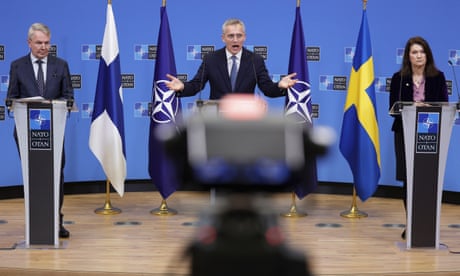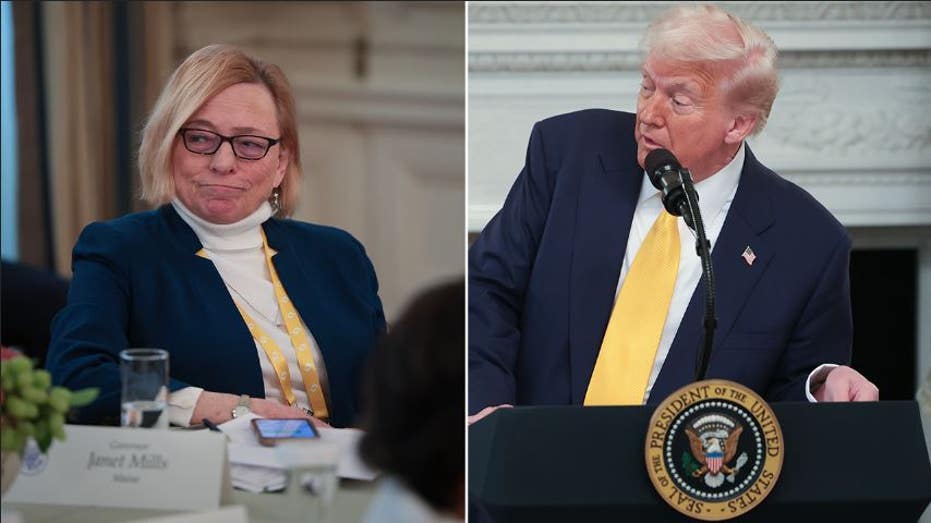- by foxnews
- 15 Mar 2025
‘A historic change’: how Sweden and Finland trod separate paths to Nato
‘A historic change’: how Sweden and Finland trod separate paths to Nato
- by theguardian
- 21 May 2022
- in news

In the words of the Swedish prime minister, Magdalena Andersson, Sweden and Finland submitted their historic Nato membership applications this week "hand in hand". But they have not travelled the same road to the alliance's Brussels headquarters.
Russia's unprovoked onslaught on Ukraine - ostensibly intended, at least in part, to prevent Nato's expansion - has ended up achieving the reverse, as the Nordic neighbours have abandoned decades of military non-alignment in a seismic shift in Europe's security order.
Each had very different grounds for staying out of the alliance until now, their neutrality rooted in different geographies, histories and national identities. Both reached the same decision this week, but what went into it was not the same.
Finland's neutrality, experts say, was only ever functional, the only possible way of dealing with the fact that it shares an 830-mile (1,340km) border with Russia, won independence from Moscow only in 1917, and twice repelled everything the Red Army threw at it during the second world war.
She said the approach was based on "good relations with Russia, and maintaining a high security capability. Well, since February, the first no longer holds."
For Finland, the membership conversation was all about security: Russia had become an unreliable and brutal neighbour, and only Nato's collective defence would be enough.
It was a big step. Those bitter Finno-Soviet conflicts - in particular the 1939-40 winter war, in which a Finnish army outnumbered three to one inflicted five times the losses it sustained - are a core part of modern Finland's history and remain a source of lasting national pride.
But Finland was eventually forced to cede 10% of its territory, and in 1948 signed a friendship and cooperation treaty with the Soviet Union. "We had to accept it was the biggest regional power," said Henrik Meinander, a University of Helsinki historian. "But we were proud we had avoided occupation. It was a very functional approach; we understood the west would not defend us. And it continued after we joined the EU. But we have always been prepared for things to get worse."
In fact, experts point out, if neutrality - succeeded, after EU membership in 1995, by military non-alignment - has been a fundamental part of Finland's foreign and security policy for 73 years, in practice things are a little less clear cut.
As early as 1992, while it was negotiating to join the EU, Helsinki bought 64 US-made Hornet fighter bombers, a clear indication of which way it was looking, Meinander said. But "politically, culturally, symbolically - this [Nato application] remains a huge move", he added.
Finnish politicians talk of a "moment of national awakening". Even in January, when Russian troops were massing on Ukraine's border, Finland's prime minister, Sanna Marin, was saying it was "very unlikely" that Finland would join Nato during her term. But when parliament voted on the question this week, only eight of its 200 MPs objected.
The change in Sweden is equally monumental, said Gunilla Herolf, a senior associate research fellow at the Swedish Institute of International Affairs. "We have maintained one doctrine for 200 years," she said. "That's a big deal. It means something to people. It becomes an identity issue."
Ask Swedes for three things that define their country, she said, and many might reply "hunting elk, eating fermented herring - and non-alignment". With Finland serving as a buffer against Russia, Sweden, which has fought no wars and joined no alliances since 1812, could fashion its neutrality along more idealistic, ideological lines.
"We were protected behind Finland, which unlike us never felt safe," Herolf said. "We had the luxury of being able to say what we liked." So over the past two centuries, but especially since 1945, Sweden carved out an enviable space for itself: peace, nuclear disarmament, international mediation, support for fledgling democracies worldwide.
That became part of the national self-image - and especially of the identity of Sweden's mighty Social Democrats, who have won every election for 100 years. Many on the left still feel Nato's nuclear deterrent raises tensions, will make Sweden less safe and cost it its pre-eminent role in global disarmament.
Herolf noted that Sweden, too, had "not always acted as a neutral or non-aligned country should". It sent military aid to Finland during the winter war, and during the cold war it had secret security contact with the UK and the US - to the point of building runways way longer than its planes needed, to accommodate US jets.
She does not buy the Nordic arguments about Finns being inherently more pragmatic than supposedly idealistic Swedes. "I'm not sure Sweden would've acted differently to Finland if it had been in Finland's geographical position," Herolf said.
But it wasn't, so it cut back its military in the 1990s, and ended conscription, before bringing it back and boosting defence spending again from 2014, when Russia annexed Crimea. Still, many in Sweden - where about 55% now support Nato membership - feel, at the very least, that the decision has been rushed.
Hence, finally, the "hand-in-hand" approach: an acknowledgment of the neighbours' strong security interdependence and cooperation in defiance of those different national stories. Finland is, at any rate, "very grateful that Sweden, despite the ideological obstacles, has taken this step", said Meinander.
When it finally came to it, she said, Russia - in spite of its multiple prior threats - essentially acknowledged what everyone knew already: Finland and Sweden were a lost cause to Moscow the moment they joined the EU. "A lot of people were really surprised by how calmly Russia has taken it," she said. Nato accession feels like a very big deal in Finland and Sweden; maybe it shouldn't.
- by foxnews
- descember 09, 2016
Neighbors react as viral 'Tunnel Girl' granted permit to continue digging massive bunker under home
"Tunnel Girl" in Herndon, Virginia, "finally" got her tunnel project approved after pausing the project due to a potential violation. Locals and social media users react.
read more


